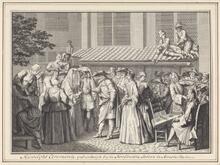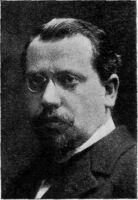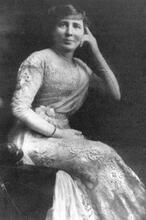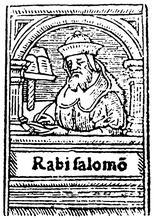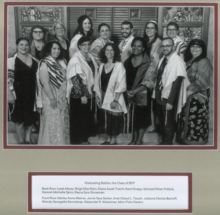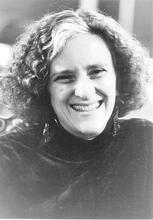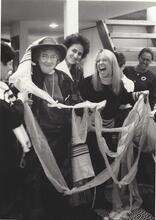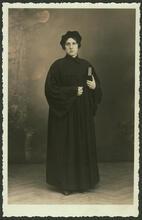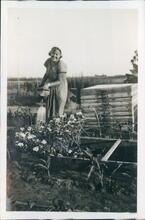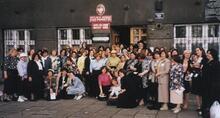Kolech: Religious Women's Forum
Kolech was founded in Jerusalem in 1998 with the aim of raising the standing of women in Jewish religious Orthodoxy. Its leader, Chana Kehat, possessed extraordinary leadership qualities and the organization received impressive media coverage, as well as much criticism from Orthodox figures. Kolech’s main achievements are a monthly pamphlet that voices thoughts on the weekly Torah portion, halakhic issues, homiletics, and Torah subjects; international conferences, held every other year; and a guide for rabbis and communal workers on how to act when approached by women for advice on intimate and other matters. Kolech is also active in the work of the Knesset, concerning laws that affect women. The aspiration to alter women’s image and their status in religious society has brought important results but still has a long way to go.
In Jerusalem in 1998, a small number of women formed a new organization: Kolech (Hebrew for Your Voice): Religious Women’s Forum, whose aim was to raise the standing of women in Jewish religious Orthodoxy. This was a direct result of the universal women's revolution.
Reasons for establishing Kolech
In the twentieth century, with the establishment of new societal norms throughout the world, in Israel, too, many new opportunities became available to women. The possibility of obtaining higher secular education in all disciplines, coupled with the almost unlimited prospects of advancing in one’s profession, emphasized the limitations and barriers still barring Orthodox women’s progress in their society, which is typically patriarchal. In synagogues and religious leadership, as well as institutions of Torah she-bi-khetav: Lit. "the written Torah." The Bible; the Pentateuch; Tanakh (the Pentateuch, Prophets and Hagiographia)Torah study (yeshivas), doors have traditionally been closed to women, but a change began to occur towards the end of the 20th century. Yet, religious women’s desire to continue to observe religious tradition and frameworks brought them face to face with a dissonant reality: impressive progress in secular society but continued submission and self-effacement in religious society.
Many Orthodox women strove to reexamine the attitude of The legal corpus of Jewish laws and observances as prescribed in the Torah and interpreted by rabbinic authorities, beginning with those of the Mishnah and Talmud.halakhah toward women; some have even gone so far as to attempt to penetrate this patriarchal system and challenge its masculine character. In other words, they wanted to continue to maintain uncompromising loyalty to the overall framework (family, congregation, community), while at the same time making exhaustive efforts to modify that framework and invest it with new, egalitarian content.
Over the last thirty years, religious society in Israel has witnessed several innovations that potentially challenged the male hierarchy of the system:
- The establishment of women’s study centers (midrashot) for high-level study of Oral Law for women and girls, sometimes including regular Lit. "teaching," "study," or "learning." A compilation of the commentary and discussions of the amora'im on the Mishnah. When not specified, "Talmud" refers to the Babylonian Talmud.Talmud study.
- The training of women as rabbinical advocates whose aim is to help women appearing before rabbinical courts.
- The first appointment of a religious woman, Leah Shakdiel, to the religious council in Yeruham, in 1988.
- Women who practice as The legal corpus of Jewish laws and observances as prescribed in the Torah and interpreted by rabbinic authorities, beginning with those of the Mishnah and Talmud.halakhic advisers with regard to Menstruation; the menstruant woman; ritual status of the menstruant woman.Niddah impurity [the ritually “impure” state of a woman during and after menstruation].
These innovations have been of major importance in empowering religious women, heightening their sense of empowerment and stimulating their desire to organize for the achievement of their goals.
These measures have resulted from cooperation between Torah-educated women and a small number of rabbis who favor an egalitarian approach. They have aroused harsh opposition in the rabbinical establishment, but they have nevertheless become operational. The success of these initiatives has proved not only that they are possible, but that they answer a real need. It has also demonstrated to at least some of the religious community that they do not represent any infringement of the halakhic system.
The formation of women’s organizations, as distinct from from the inclusion of women in men’s organizations, is perceived as an extremely effective strategy for the achievement of women’s goals. In that way women strengthen their own self-awareness and refrain from adopting masculine norms. Religious women in Israel were encouraged to organize by developments in New York. The example of the Jewish Orthodox Feminist Alliance (JOFA), founded in 1996 in the United States, inspired a few dozen religious women from Israel who were seeking a platform for a new initiative. As a result, in 1998, they founded Kolech.
Early Years
In its early years, one of the most important assets of the Israeli organization was its leader, Chana Kehat. Kehat, (1959 - ), then in her late thirties, was raised in a distinguished family of haredi (ultra-orthodox) Torah scholars and later became a “religious Zionist,” and she proved to possess extraordinary leadership qualities. Over and above her intellectual capabilities and her knowledge of halakhah and Jewish thought, she demonstrated tremendous sensitivity, perseverance, and dedication to the organization and its goals. An eloquent public speaker and mother of a large family, her personality captivated all who met her. Representatives of the press frequently interviewed her, seeking and airing her views on a wide variety of topics affecting women and halakhah. The organization was virtually identified with her persona. Since 2004, when Kehat resigned for personal reasons, a committee of twelve women, one of whom acts as chair, has been chosen every few years to lead and operate the organization.
The name of the organization, “Kolech: Religious Women’s Forum,” was chosen with the express intention of bringing the female voice to center stage, inspired by a famous verse from the Song of Songs: “Let me hear your voice, for your voice is sweet.” The address of the lover to his beloved “may be interpreted … as the unique promise of the Almighty, throughout human history, to listen to the female voice” (Kehat 2001). The female voice must be restored to its proper place in history—this basic demand is being repeated again and again by women throughout the world, who have been silenced in patriarchal societies for centuries.
Kolech was not created with a clear-cut, well-defined agenda. The founders entertained the somewhat messianic hope that, in keeping with the religious belief in tikkun olam—improvement of the world—and the centrality of Torah values, women too wish to be part of this process through their spiritual contribution. Kolech is not an organization whose sole purpose is to improve the lot of women in religious society; rather, its mission was to purify Judaism, to transform it from a situation of “temporary morality” (i.e., a deficient world) to a situation of absolute morality (a perfect world).
The organization first attracted public attention with a recurring pamphlet that started to appear in the summer of 1998, discussing the weekly portion of the Torah reading, appearing under the heading “Kolech.” These pamphlets, for the most part written and edited by women, voiced thoughts on the weekly Torah portion, halakhic issues, homiletics, and various Torah subjects, which had hitherto not been within the purview of religious women. While the pamphlets brought women’s Torah learning and thought to numerous homes, their innovative element was so clear that it aroused antagonism. Today Kolech is active in promoting learned women by organizing for them opportunities to preach in synagogues around the country.
Kolech achieved its most impressive public presence in international conferences, held every other year mostly in Jerusalem beginning in 1999. Each conference is generally attended by approximately a thousand active participants and receives media attention in the general and religious press. The proceedings of the conferences are published under the title “To Be A Jewish Woman.”
Widening Scope
The issues that were discussed changed over the years. At the first conference, lectures were given on the subject of Torah learning for women, pointing out the possibilities and inherent dangers and presenting the question of how to relate to women’s creative thought on Torah subjects and how it could be integrated with men’s writings. Two years later, at the second conference, there was no repetition of questions of this nature. The first conference had convincingly demonstrated both the impressive halakhic knowledge of many members of the new organization, as well as the existence of firmly established contacts with several well-known rabbis of a liberal-religious mind-set.
Over the years, there have been positive developments in several of the areas dealt with by the organization. The fear that the feminist initiative would undermine the religious framework has in some measure died down in some religious circles. The plenary sessions have dealt prominently with women’s societal concerns and difficulties, such as agunot and women denied divorce, as well as sexual abuse and the attitude of religious society to abusers. These questions were deliberated on both theoretical and practical levels. The Third Conference hosted a battered wife who told her life story. Another woman, a victim of long-standing sexual abuse, related how she came to grips with the situation. This presentation of problems from a personal, emotional viewpoint, as well as on a theoretical level, was a most powerful demonstration of Kolech’s role not just as an organization for academic deliberations, but also as a supporting arm for religious women who on the one hand refuse to be silenced but, on the other, refuse to abandon their religious way of life.
Since 2004 Kolech initiated a colloquium of rabbis, including some not identified with its goals, and religious women from several women’s organizations, which together drew up a “code of ethics”—a guide for rabbis and communal workers on how to act when approached by women for advice on intimate and other matters. This initiative resulted in the formation of a new committee, called Takana (Hebrew: regulation), which played a preliminary role in investigating cases of sexual harassment, or even rape, in the religious community. (The committee is advised by lawyers, and when necessary cases are referred to the police)
Along with its concern for legal issues, in the early 21st century Kolech established an educational team to draw up curricula for different age groups, first to teach girls and boys egalitarian concepts and later to prepare them for married life, and especially for sexual relations. The members of the organization realized that the only way to equalize relations between the sexes is through education. Likewise, many other problems plaguing the religious community, such as the large number of women who remain unmarried or marry late, point to the need for innovative education, to help young men and women maintain relationships in the new egalitarian society.
Kolech is also very active in various halakhic and civil legal projects, such as prenuptial agreements, whose aim is to reduce as much as possible difficulties which occur when a couple wants to divorce, and marriages according to halakhah, but without the participation of the State Rabbinate. Kolech is also active in the work of the Knesset (Israeli Parliament), concerning certain laws which affect women.
The aspiration to create a new social order, that is, to alter women’s image and their status in religious society, has brought some important results, but there is still a long way to go. The opponents of Kolech are still active, but women learning Torah is not a novelty anymore. Yet, women cannot get approval to be recognized as Rabbis. Indeed, while the preliminary achievements of Kolech are promising, they are also disappointing. Since the most serious problems, such as civil marriages, relief for agunot and women denied divorces, still await solutions.
Cherlow, Yuval. “Women’s Torah Learning,(.*)—Prospects and Dangers.” In To Be a Jewish Woman. Proceedings of the First International Conference: Woman and Her Judaism, edited by Margalit Shilo, 67–72. Jerusalem: 2001.
Kehat, Chana. “Opening Address.” In To Be a Jewish Woman, edited by Margalit Shilo, 13–16. Jerusalem: 2001.
Proceedings of the six International Conferences: To be a Jewish Woman, vol. 1 – 6. 2001 – 2013.
Shilo, Margalit. “A Religious Orthodox Women’s Revolution – The Case of ‘Kolech,’ 1998 – 2005.” Israel Studies Forum, Vol. 21, July 2006, pp. 81 - 95.


